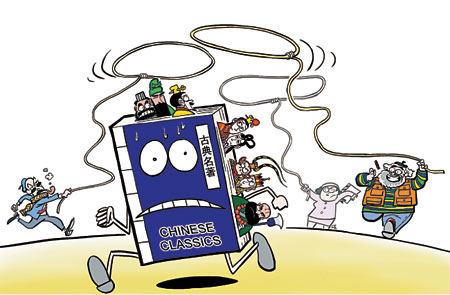Classics provide pound of flesh

In Journey to the West, one of the main protagonists, Monk Xuanzang, is chased by monsters who want to eat his flesh and thereby live forever. In the same fashion, directors appear to view classic Chinese novels as "monk's flesh" - timeless, precious and always popular among audiences.
As such, a slew of TV drama and filmmakers are currently reviving the four Chinese classics, namely: Journey to the West, Dream of the Red Chamber, Romance of the Three Kingdoms, and Outlaws of the Marsh.
Zhang Jizhong is hoping to improve his reputation, after his lame adaptation of Hong Kong writer Louis Cha's martial arts novels, by shooting a new version of Journey to the West, the adventures of a monk and his three disciples.
Zhang Jinlai, who played Monkey King in the novel's much-loved 1986 TV version, is challenging himself again with a film on the same subject.
Meanwhile, director Li Shaohong has announced that she will produce a new version of Dream of the Red Chamber, which details family life and social structures in 18th century China. Li's efforts will inevitably be compared with the much-loved 1987 version, which has been aired more than 700 times.
As for the war epic Romance of the Three Kingdoms, a number of directors are fighting for the chance to make a new version, after the old TV series was a big success in 1994. A film starring Hong Kong superstar Andy Lau is also in the works.
Finally, Wu Ziniu said he has secured the funding and would be assembling a global cast of actors soon for Outlaws of the Marsh.
This fever for the classics has many causes but chief among them is the bank ability of the books.
First of all, the classics are not under copyright so no royalties need to be paid. Secondly, they are profoundly popular - and not just in the Chinese-speaking world. Thirdly, any remake of the classics generates instant publicity.
Deng Luping, spokesman for the new TV drama Outlaws of the Marsh, said the story is a gold mine.
"There is no limit to the number of franchises because the novel is so popular. 'Outlaw' comic books, animations, every project is a big piece of cake, and this doesn't include product placement and advertising."
Deng said there are three towns that claim the Outlaws' story as their own and want filming to be done in their area. His team is also preparing to shoot a TV contestant show to find actors. He is confident to see a bunch of sponsors. Beijing TV, one of the investors behind the new TV series Dream of the Red Chamber launched a similar show last year.
It is not just China that loves its four classics. Other Asian countries, especially Japan and South Korea, have their fans too. Japan has shot at least three TV dramas and cartoons based on Journey to the West.
According to Ma Zhongjun, one of the investors behind the new Journey TV drama, buyers from Britain, France, Germany and Japan are in negotiation with Chinese buyers.
Another change for the four classics is in the area of technology. Deng said Outlaws deserved an updated look.
"Compared to 10 or 20 years ago, when the classics were brought back to life, the development of effects will make the war scenes and special stunts more exciting to watch," he said.
In the 1986 version of Journey to the West, he said, the Monkey King's flying scene looked as if it was a character stuck on a board.
Former Monkey King, Zhang Jinlai, said he was anxious about whether the new dramas and films would be faithful to the originals, which he called precious treasures of traditional Chinese culture.
"I support different acting styles," he said. "But I really worry about the scripts. In some Japanese versions, Monkey King has an affair with his mentor, while in another, some of the disciples become gay. I cannot bear spoof versions of the works, and most Chinese people will not tolerate that, either."
He proved his point following a public spat with online writer Ning Caishen, who said that anyone had the right to adapt the novel as they saw fit. Following negative reaction to his comments, Ning was forced to apologize.
"The Monkey King and the characters in the other three books are beloved characters in China," Zhang said. "The story should maintain the philosophy and core value of the original works, which is a difficult job. If some director thinks today's young audience wants to see Monkey King having an affair with a female monster, they are making a big mistake."
Zhang said he was also worried about the quality of some of the new projects.
He said crew on the 1987 version of Dream of the Red Chamber took three years to read the novel and be trained to produce it. The new Dream, however, will be wrapped up inside a year, with a new episode every week.
Zhang said the commitment of actors was also questionable.
"It is hard to imagine, nowadays, a star who will spend even one year on a single project because what they need is frequent publicity," he said.
Additionally, when the four classics were previously filmed, it was by China Central Television, China's national TV station backed by the government, with all its many resources. Today, there are multiple investors, whose varied understanding of the classics could leave little space for the director and actors to make their mark.
"The works are more like commercial products than artistic pieces," Zhang complained.
(China Daily 11/20/2007 page18)














